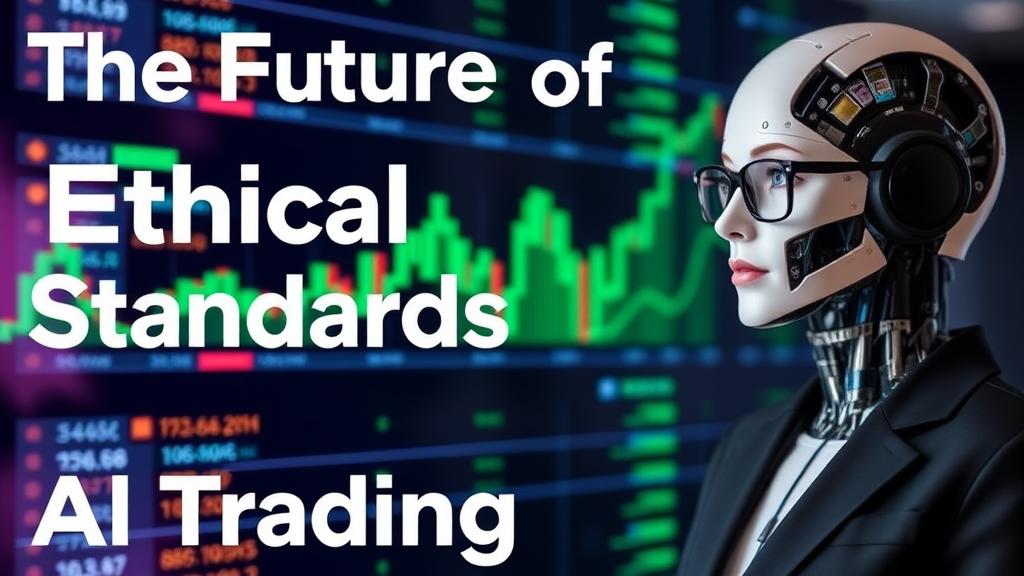Prompting Readers to Consider New Possibilities
What if your trading strategies could react in milliseconds? Algorithmic investing makes this possible—let’s explore the potential.
The Future of Ethical Standards in AI Trading
As technology rapidly evolves, so do the complexities and ethical dilemmas associated with its use. Artificial Intelligence (AI) has permeated various sectors, but its application in trading—particularly in financial markets—raises questions about fairness, transparency, and accountability. As we look towards the future of AI trading, it’s essential to understand the ethical standards that should govern this innovative technology. This article explores the implications of AI in trading, the current landscape of ethical standards, challenges ahead, and the future direction of ethical practices in this field.
Artificial Intelligence in trading refers to the use of algorithms and machine learning models to analyze market data, predict price movements, and execute trades. AI systems can process vast amounts of information faster than human traders, allowing for high-frequency trading and improved decision-making.
Key Features of AI Trading
- **Data-Driven Insights**: AI can analyze historical data and current market conditions to identify patterns and trends.
- **Automation**: Algorithms can execute trades automatically based on predefined criteria, minimizing human error.
- **Risk Management**: AI can assess risks in real-time and suggest strategies to mitigate potential losses.
- **Personalization**: AI can tailor trading strategies to individual investors based on their risk profiles and investment goals.
The Current Ethical Landscape in AI Trading
As AI trading systems gain popularity, the need for ethical standards becomes increasingly apparent. Currently, the ethical landscape is shaped by several key factors:
1. Regulation
While some regulatory bodies have begun to establish guidelines, the landscape remains fragmented. Different countries have varying degrees of oversight:
- United States**: The Securities and Exchange Commission (SEC) has started to scrutinize AI trading practices but lacks comprehensive regulations.
- European Union**: The EU has made strides towards regulating AI through proposals like the AI Act, which aims to create a standardized framework for AI ethics.
- Asia**: Countries like Japan and Singapore are also exploring regulatory frameworks, but there is still inconsistency across the region.
2. Transparency
Transparency in AI trading is essential for building trust among investors. Current practices often lack clarity on how algorithms make decisions. Investors need to understand the logic behind trading strategies to assess their risks.
3. Fairness
The use of AI in trading raises concerns about fairness. High-frequency trading (HFT) algorithms can create an uneven playing field, where institutional investors with access to advanced technology can outpace retail investors. Ensuring equitable access to trading tools and data is a pressing ethical concern.
4. Accountability
When an AI trading system makes a mistake—leading to significant financial losses—who is held accountable? The lack of clear accountability can lead to ethical dilemmas, particularly when automated systems operate without human oversight.
Challenges in Establishing Ethical Standards
Despite the need for ethical standards, several challenges hinder their development and implementation in AI trading:
1. Rapid Technological Advancements
The fast pace of AI development makes it difficult for regulators to keep up. As new technologies emerge, existing regulations may become obsolete or inadequate.
2. Complexity of Algorithms
AI algorithms can be incredibly complex and opaque, making it challenging for regulators to understand how decisions are made. This “black box” phenomenon complicates efforts to enforce transparency.
3. Global Disparities
The international nature of financial markets means that discrepancies in ethical standards across countries can create loopholes. Traders may exploit jurisdictions with lax regulations, undermining global efforts to establish a uniform ethical framework.
4. Resistance from Industry Players
Some financial institutions may resist regulatory efforts, arguing that stringent ethical standards could stifle innovation and competitiveness. Balancing ethical concerns with industry growth is a delicate challenge.
The Future of Ethical Standards in AI Trading
Looking ahead, the future of ethical standards in AI trading will likely evolve through collaboration among various stakeholders, including regulators, financial institutions, and technologists. Here are several key trends to watch:
1. Development of Comprehensive Regulatory Frameworks
As AI trading continues to grow, we can expect more comprehensive regulations that address its unique challenges. Potential developments include:
- Standardized Guidelines**: Establishing uniform ethical standards for AI trading across jurisdictions.
- Enhanced Oversight**: Regulatory bodies may implement stricter monitoring of AI trading activities to ensure compliance with ethical guidelines.
2. Emphasis on Transparency and Explainability
The demand for transparency will drive the development of explainable AI (XAI) systems. These systems will allow traders and regulators to understand and interpret the decision-making processes of AI algorithms, fostering trust and accountability.
3. Ethical AI Design
Financial institutions will increasingly prioritize ethical considerations in the design and deployment of AI trading systems. This may involve:
- Bias Mitigation**: Implementing measures to identify and reduce biases in training data.
- Ethical Audits**: Conducting regular audits of AI systems to ensure adherence to ethical guidelines.
4. Collaborative Efforts
The future of ethical standards in AI trading will depend on collaboration among various stakeholders:
- Cross-Industry Partnerships**: Financial institutions, technology firms, and regulators will need to work together to establish best practices.
- Public Engagement**: Engaging with the public and investors to understand their concerns and expectations regarding AI trading.
5. Consumer Protection Initiatives
As AI trading becomes more prevalent, protecting consumers will be a priority. Potential initiatives may include:
- Educational Programs**: Providing resources to help investors understand the risks and benefits of AI trading.
- Enhanced Reporting Requirements**: Mandating clearer disclosures about AI trading practices and potential risks involved.
Conclusion
The future of ethical standards in AI trading is a topic of increasing importance in our technology-driven world. While challenges remain, there is a growing recognition of the need for comprehensive regulations and ethical frameworks to guide the development and implementation of AI in financial markets. Collaboration among industry players, regulators, and the public will be essential to creating a fair, transparent, and accountable trading environment. As we move forward, the establishment of robust ethical standards will not only enhance investor confidence but also ensure that AI trading contributes positively to the financial ecosystem. The journey towards ethical AI trading is just beginning, and its success will depend on our collective commitment to navigate the complexities ahead.



